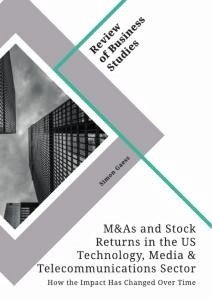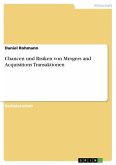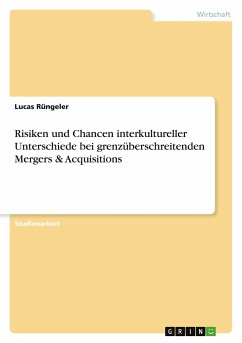Bachelor Thesis from the year 2021 in the subject Business economics - Review of Business Studies, grade: 1,0, LMU Munich (Institute for Capital Markets and Corporate Finance), course: Bachelor Thesis, language: English, abstract: This bachelor thesis sets out to investigate whether the observed past and present effects of M&A deal announcements on target and acquirer cumulative abnormal returns (CARs) to shareholders, also occur on an industry-specific level in the U.S. Technology, Media & Telecommunications (TMT) industry, and over time by reviewing three distinct time frames between 2000 and the end of 2019. This thesis emphasizes ¿mega-deals¿, which are M&A transactions with values greater than or equal to USD 500m. The recentness of the data and the emphasis on deal-value and industry-specific M&A deals make these findings unique. The event study method is applied to examine the concrete effects that an event, an M&A deal announcement, exerts on acquiring and target firm stock returns. Hereby, the difference between the actual stock returns¿which occur due to the event¿and the expected stock returns is analyzed and subsequently tested for significance. The main and null hypothesis of this thesis is that M&A deal announcements have no effect on the average of the stock returns of acquiring and target firms. A frequently studied area and old research question of corporate finance, ever since its initial inception in the 1960s, is the effect of mergers and acquisitions (M&As) on the wealth of shareholders of the acquiring and target companies. As recently as the early 2010s, a near-universal consensus amongst research and business press has existed, that M&As tend to generate little to no shareholder value for acquiring firms, while target shareholders incur significant returns. These findings draw on the theory of market efficiency and rational expectations to assume that such changes to the stock prices, abnormal returns (ARs), reflect the discounted value of expected future profits, i.e. cash-flows and rapidly price-in new publicly disclosed information, such as a merger announcement. Since 2012, however, a novel strand of research has emerged which has observed these previously low ARs for acquiring shareholders becoming on average significantly positive for the first time in history on a global scale following the Great Financial Crisis (GFC). This is attributable to an ensuing overall improvement to corporate governance frameworks and M&A dealmaking. Markedly, this trend was later found to start reversing back to previous pre-GFC levels.
Bitte wählen Sie Ihr Anliegen aus.
Rechnungen
Retourenschein anfordern
Bestellstatus
Storno








